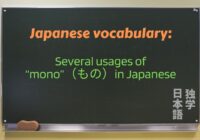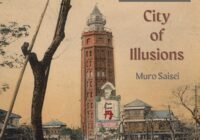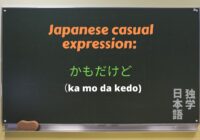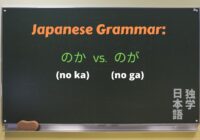Several usages of “mono”(もの)in Japanese
“Mono” in Japanese (usually written in hiragana as もの, and sometimes in kanji as 物) is a word that has the basic meaning of “thing”, generally in the sense of a physical (often tangible) thing. 店でいいものを買ったよ (mise de ii mono wo katta yo) I bought something good (=a good thing) at the store. However this… Read More »
Movie review: Bullet Train (a surprising connection to Japanese literature)
I’ve had a special interest in Japanese culture for almost as long as I can remember, and can often appreciate books, movies, or TV series that try to highlight some interesting, unique, or significant part of Japan’s culture. But I’ve developed a good sense of which of these have an authentic feel and intent, and… Read More »
Anime review: “Cyberpunk Edgerunners” (a modern classic)
When I was first learning Japanese over two decades ago I watched a huge number of anime movies and series, and especially loved classics like Ghost in the Shell, Akira, and Cowboy Bebop. It’s fair to say Japanese anime was one of the driving factors that motivated me to seriously study Japanese language and culture,… Read More »
Japanese bilingual literature book release: “Tokyo: City of Illusions” by Muro Saisei (室生犀星)
Japanese drama review: 『ミステリと言う勿れ』(misuteri to iu nakare)
Japanese dramas, like anime, are something that I have gradually lost interest in over time. While I still enjoy a good drama or anime now and then, I’ve become familiar with all the common tropes and am sensitive to the acting and other parts of the production, so I frequently get bored after a single… Read More »
Japanese Literature Audio Narration: Acala the Immovable (by Soto Tachibana)
Arigatai Books End-of-Year Sale (Japanese Literature)
Many countries and cultures ascribe special meaning to the end of the year, whether it is for a religious, cultural, or business reasons. As a small, independent publisher, Arigatai Books doesn’t typically do much in terms of season discounts or special promotions, but at the end of the year I like to showcase a few… Read More »
Japanese casual expression: かもだけど (kamo dakedo)
Learning a language involves not just understanding the meanings of words and combinations of words, but also their nuances and when it is appropriate to use them. In this post, I would like to go over the casual expression “かもだけど” (ka mo da kedo). This expression is composed of two parts, the “ka mo” and… Read More »
Japanese grammar: the difference between “のが” and ”のか”
Recently someone on Twitter was asking about the difference between “のが” (no ga) and ”のか” (no ka). I responded briefly to their post, but I wanted to give a little more detailed treatment here. In the case of “のか”, the の is often used to an explanatory or factual feeling, similar to how it does… Read More »









